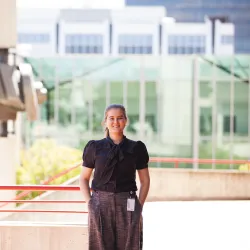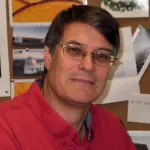
Overview
If you are looking for that little bit extra in your degree, the Bachelor of Science (Advanced) (Honours) provides the same breadth of opportunities as the Bachelor of Science, with the addition of an honours year designed to extend your understanding and introduce you to concepts that are more advanced than standard course activities.
Honours year
- A fourth year of study that is a continuation of an undergraduate degree focused on a research project
- Identify a supervisor and an area of research
- Full-time for two consecutive semesters and includes research training
- Honours extends the knowledge and skills developed during the Bachelor degree and provides a solid foundation in the practice of research suitable for entry to a broad range of careers or to a PhD.
Program details
The Bachelor of Science (Advanced) (Honours) is a four degree program ideal for students who are seeking a direct pathway into Honours.
One of the special features of this program is that it is embedded with Honours Pathway Options/Courses. This provides you with the opportunity to undertake activities designed to extend your understanding and introduce you to concepts that are more advanced than standard course activities as well provide an early introduction to research training that will better prepare you for your Honours years. For added flexibility, up to a third of your courses can be from other areas of the University, so you can tailor a program to your interests.
The first three years of this degree is coursework studies. The fourth year is a research-intensive honours year.
Key facts
- #1 for Natural Sciences (QS 2024) in Australia
- 4 years full-time
- Semester 1 & 2 intake
- #1 in Australia for graduate employability (Times Higher Education)
Testimonials

Ellen Miech
“I did a Bachelor of Science (Advanced) (Honours). My major was biology with a specialisation in plant sciences, but my honours project had a focus on coding and technical skills. When I applied for a job at the Department of Agriculture and Water Resources, they told me later they employed me because my degree gave me these skills that no-one else in the team has.”

Tanya Javaid
"I’ve always had a keen interest in molecular biology and gene technology, which is why I chose a Bachelor of Science (Advanced) (Honours). Plus, I’ve also always been interested in research and knew that I wanted to do an Honours project after my degree so I picked a program that would allow me to do so."
Careers
Jobs are available in administrative, ecological and technological arenas, but as high quality scientists are in demand, many graduates proceed to further studies (such as at the Graduate Diploma, Masters and Doctoral level) in order to retain a competitive edge in their chosen field. Some graduates undertake specific graduate-level training in areas such as teaching, librarianship or communications to further equip themselves with particular and marketable skills.
Employers are increasingly looking for graduates not only with excellent academic results, but also with good communication, interpersonal and analytical skills.
The Australian National University has been ranked as the top university for graduate employability in Australia in the Global University Employability Ranking 2023-24. As a student at ANU, you gain access to the ANU CareerHub – an online career development and employability tool that includes a jobs board and careers resources. You also have access to drop-in chats with a career consultant and to attend our career fairs to meet potential employers.
Learning experience
Fees & scholarships
Scholarships
Whether you are looking for financial support to start your studies at ANU or help to move away from home for the first time, we have scholarship opportunities for you and your situation.
Key people

Associate Professor Andrew Berry, Earth Sciences first year coordinator

Andrew's research focuses on the geochemistry behind the mobility, transport and re-distribution of elements during high-temperature processes. His areas of expertise include Structural chemistry and spectroscopy, Inorganic geochemistry, planetary science, igneous and metamorphic petrology, mineralogy and crystallography, and geochemistry.

Professor Stephen Roberts, Mathematics first year coordinator

Stephen's research area is the application of efficient and robust numerical methods for the solution of partial differential equations. He develops efficient and robust numerical methods for the modelling of tsunami and flood events.

Professor Michael Platow, Psychology first year coordinator

Professor Platow specialises in social and community psychology. He has been recognised for his teaching excellence at ANU with multiple teaching awards.
How to apply
Understand the how to apply steps
Visit the domestic undergraduate applications page to prepare for your application to ANU.
Domestic undergraduate applicationsUnderstand the how to apply steps
Visit the international undergraduate applications page to prepare for your application to ANU.
International undergraduate applications


